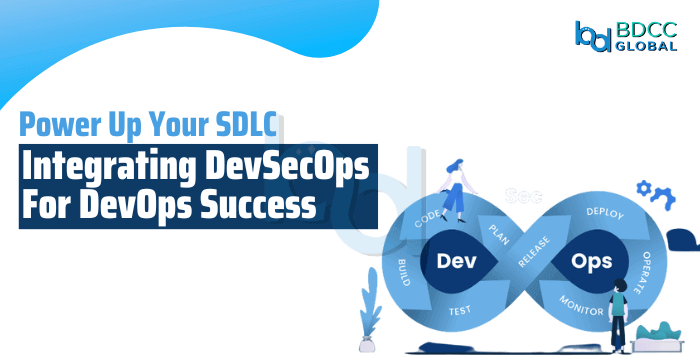
Are you tired of discovering security vulnerabilities in your software only after deployment? Wouldn’t it be great if you could weave security into every step of your software development lifecycle (SDLC), ensuring a more robust and secure end product? Introducing DevSecOps – the answer to all your software security concerns.
Do you often wonder how you can seamlessly integrate security within your existing DevOps practices? Are you curious about the best practices to follow for a successful DevSecOps implementation? If your answer is a resounding “Yes,” then you’ve come to the right place. This DevOps guide will walk you through the world of DevOpsSec, offering valuable insights and practical advice for incorporating security throughout your SDLC. Get ready to revolutionize your software development process!
Understanding DevSecOps Key Concepts
DevSecOps combines three core disciplines in the software development lifecycle: development (Dev), security (Sec), and operations (Ops). It combines information security best practices with DevOps processes so developers can continuously integrate and deploy code changes. The key concepts of DevOpsSec include:
Shift-Left Security Approach
The shift-left approach is the fundamental concept of Security Integration in DevOps. DevOps teams collaborate with cybersecurity experts at the beginning of the SDLC process to detect:
- Potential security vulnerabilities
- Potential threat vectors
- Meet compliance regulations
As the DevOps security Aspect shifts at the beginning of SDLC, this approach is called the “Shift-Left” approach.
Holistic Automation with CI/CD
CI/CD is a fundamental DevOps practice that automates all SDLC processes, including code builds, testing, and deployment. With DevSecOps, automation becomes a stratic approach to executing well-planned CI/CD processing. So all DevOps teams perform consistent cybersecurity testing to find the following:
- Software dependencies
- Impact of Changes on the overall security performance
Continuous Security Testing
To incorporate code security and application security, continuous testing is extended with automated testing functions. It introduces the “Security as Code” approach, which treats security as software code. Thus Software Testers and QA teams can corporate with each other to:
- Analyze build quality
- Track security vulnerabilities
- Add dynamic testing functions
- Perform static application testing
Continuous security testing can be integrated into CI/CD pipelines to establish security policies early in the SDLC process.
Collaboration With Continuous Improvement
Collaboration is essential in DevSecOps. It involves bringing together multiple functional teams, developers, security professionals, executives, and business owners. As teams get to work together throughout the software development lifecycle, everyone follows a shared responsibility to identify and address potential security vulnerabilities in real-time.
DevOps Guide About DevSecOps Best Practices
Implementing DevOpsSec requires a complete shift from old DevOps operations. It changes the mindset with the willingness to embrace better ways of incorporating security prospects at different stages of SDLC. Let’s define the DevSecOps best practices that organizations should follow.
Make Security a Priority
Security should come first in DevOps. From design to code delivery, it should be well-integrated at every stage of SDLC. DevOps professionals should master secure coding practices to understand how to use security tools during development.
Learn Important Security Acronyms
- SBOM (Software Bill of Materials) contains all platform engineering software dependencies.
- DAST (Dynamic Application Security Testing) analyzes running apps to identify security threats.
- SCA (Software Composition Analysis) to identify security vulnerabilities in third-party tools and components.
- SAST (Static App Security Testing) to detect errors in the source code.
- IAST (Interactive Application Security Testing) to check the app’s source code while the app is running.
Automate Everything
Automation is essential in SecDevOps. DevOps professionals should focus on automating most manual operational tasks for testing and deployment. Automation reduces manual errors, speeds up the development process, and improves the quality of the software.
Embrace Open Source
DevOps consulting teams should embrace open-source software tools and libraries to enhance the security capabilities of the implemented DevOps solutions. Using open-source software like Git, Jenkins, etc., adds security to the CI/CD SDLC process. Hence, organizations should use more open-source software.
Monitor and Respond To Threats
Security Enhancement in DevOps is an ongoing process. Hence, security professionals should monitor and respond to security threats promptly. For that, professionals should use security monitoring tools and respond to the detected threats in real-time. Professionals can follow an incident response plan to resolve security incidents quickly and effectively.
What To Expect In The Future?
With the growing demand for agility and speed in SDLC, DevSecOps will emerge as a crucial component to help deliver software with greater security. Hopefully, this DevOps Guide has helped you understand the key concepts and best practices of SecDevOps. So future organizations must strengthen their cybersecurity knowledge and make it essential to adopt this approach. By prioritizing security, companies can encourage developers and operations teams to work with a shared responsibility to enhance the security prospects of SDLC processes!
BDCC
Latest posts by BDCC (see all)
- How AI Is Reshaping DevSecOps Governance - April 4, 2025
- Using AWS Auto Scaling to Handle Traffic Spikes Efficiently - April 1, 2025
- Disaster Recovery Strategies with Terraform: Building Resilient and Highly Available Infrastructure - March 28, 2025

